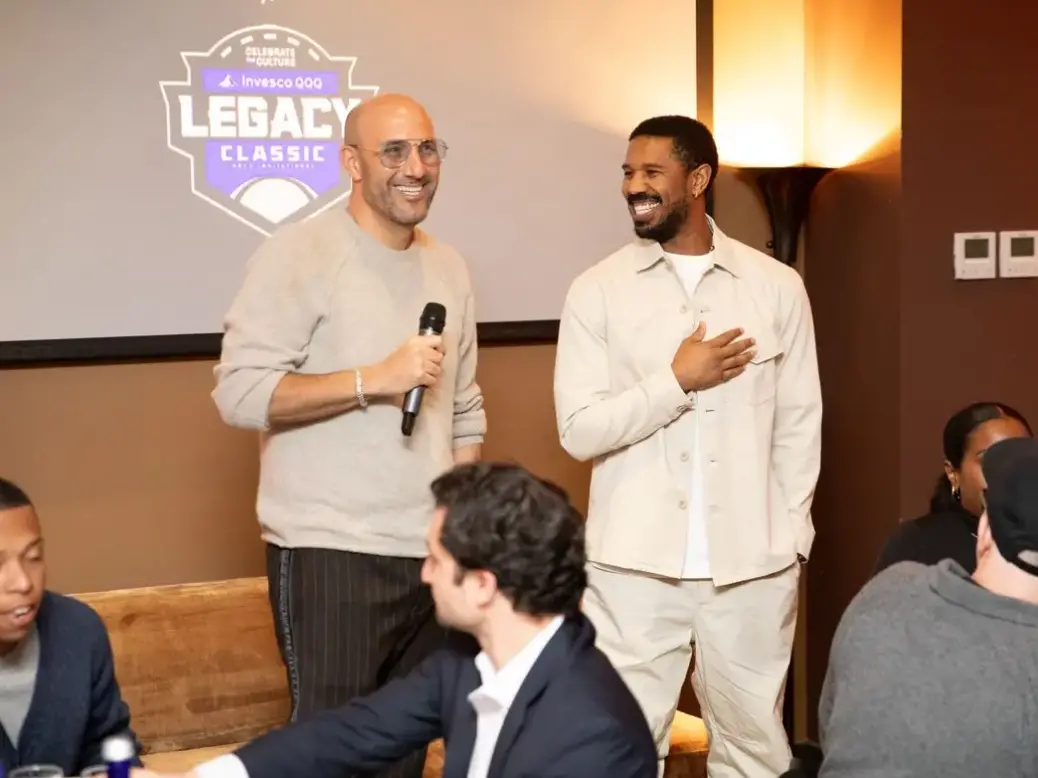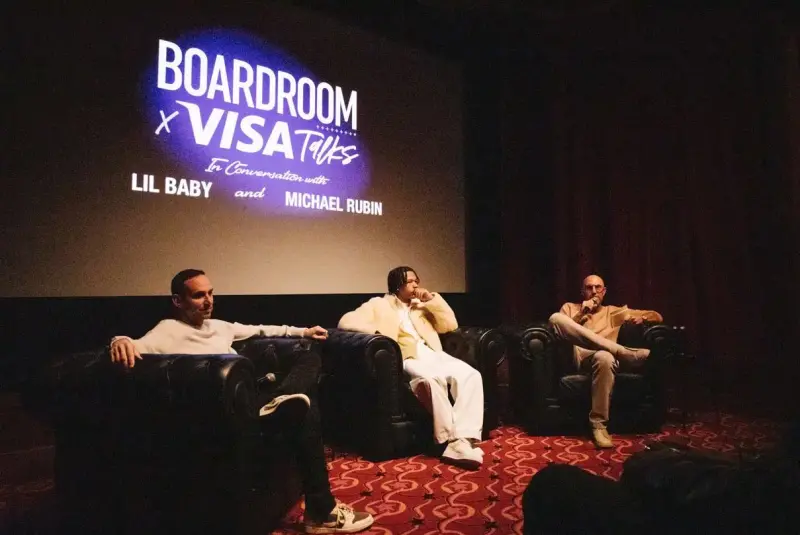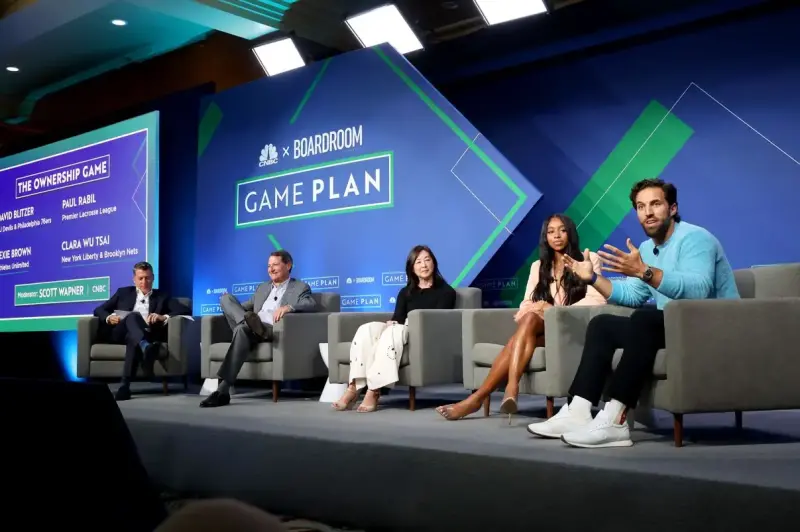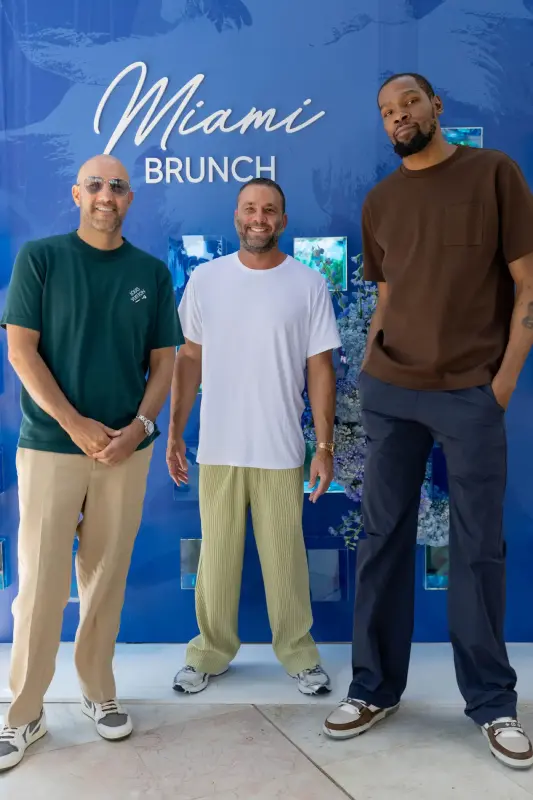
US sports media brand Boardroom has almost tripled its events revenue in a year as it brings B2B insight to a wider audience.
Boardroom was co-founded in 2019 by pro basketball player Kevin Durant and his agent and business collaborator, Rich Kleiman.
Sarah Flynn, chief marketing officer of Boardroom, told Press Gazette its focus “has always been bringing what’s going on in the business of sports and entertainment to consumers and really sort of opening the door and giving them some of the access that we have around what those conversations are and what’s really going on in those worlds”.
Boardroom’s content output is focused on its four email newsletters, two video series and a monthly Boardroom cover story interview feature with a “trendsetter or trailblazer” athlete or entertainer.
Across some of its core platforms it has 200,000 newsletter subscribers, 813,000 Youtube subscribers and 633,000 Instagram followers.
But Boardroom, which has a team of just under 30 people, has put increasing focus on its events business and plans to run up to 12 this year – about three times more than in 2023.
Flynn said events have also almost tripled in terms of revenue in a year and now make up 30-40% of growingttotal revenue.
Boardroom’s three types of events: From partying to ‘tastemaker’ conversations to a sports business conference
Boardroom, Flynn said, currently runs three types of events. The first is “being the talked about party” at a massive sporting moment, for example at the NBA and WNBA All-Star Weekends and F1 Miami where they want to be “engaging with the athletes and entertainers who are in our network”.
The second type of event is a “more curated, thoughtful, conversation-plus”. For example the first Boardroom X Visa Talks event, held in New York in November, featured a conversation between rapper and entrepreneur Lil Baby and [sports apparel company] Fanatics chief executive Michael Rubin as part of a “VIP one of a kind night out”.

Flynn said: “Visa really wanted to get a bunch of influential New York City tastemakers in a room, have an incredibly curated event and make it really feel like a night out in New York like you couldn’t get anywhere else…”
But, she added, “they also wanted some kind of direct to consumer story to tell and they wanted to be able to like go out into the world with social content and have the event live beyond just that night.
“So we created a very robust social and digital strategy using clips from the event, using quotes and longer tail building out a couple of weeks after the event, things that we knew would resonate with a larger audience. So we were able to generate an additional ten million impressions for them from a D2C standpoint, while also curating a VIP room and giving that exclusive experience.”
Some events are more suited to exploiting later for consumer content than others: the NBA All-Star Weekend, for example, resulted in carousels of the people who attended which still do “really well” but don’t have a thought leadership element.
Also in this category of events is a new partnership with Major League Baseball. Boardroom is putting together a curated series of dinner focused on having MLB players network with people like CEOs and athletes from other sports so they can have “meaningful conversations that they’re not actually getting access to in their day to day”.
Finally, the third tentpole is a “full-on sports business conference” – specifically the flagship event Game Plan which debuted last year in partnership with US business news channel CNBC, is returning in September and is contracted again for 2025.

Flynn said: “The goal with that one is very much to set ourselves apart from other sports business conversations, have really thoughtful engaging conversations, have the networking experience be truly premium. For example, last year almost every person that spoke on stage stayed throughout the entire event, and most of them stayed all the way through the cocktail and networking hour and I’ve actually never seen that happen at another conference… So that’s what we strive to bring to people. It’s just like, everybody in this room is so great and so special that everybody wants to stay in that room.”
‘Lightning bolt moment’ that heralded potential of Boardroom events
Signing the deal with CNBC to put on Game Plan was the “lightning bolt moment” for Flynn that showed the events business was “going to be really important and special”.
“CNBC had never done an experiential deal with a third party,” she explained. “They had had a lot of conversations about doing things in the sports space. They had never made it across the finish line and they made that very clear to us when we started speaking with them. That we were able to do that and that they saw the value in what we were doing, I think legitimised a lot for us.
“And also the success of that conference, I think, really helped build across the board. We had already sort of been working on the B2B space, it was very clear that we can throw an incredible party with incredible guests, but being able to add to that the conference angle and the networking angle and the conversations that are elevated in sports business, I think helped a ton.”

Asked how Boardroom has built up a reputation for being a go-to place for high-profile attendees and curated conversations in five years, Flynn said they started with a strong network and access as the C-suite all have “extremely strong relationships in the industry”.
“We have incredible relationships with every major sports and entertainment agency – because we’re not an agency ourselves, no one sees us as competition,” she said.
This means, for example, that at the NBA All-Star Weekend where brands throw their own parties and there are competing events going on, “the Boardroom event was the thing that everybody could go to together… It’s the one that everybody wants to go to at the end because we’re sort of a neutral party and I think we were able to leverage that to our advantage during major sports moments. And once we had that stake in the ground, it was very clear to people that we could do that and replicate that feeling across many other different areas.”
Boardroom is also helped by the name recognition of its co-founders, who Flynn said carry a “legitimacy and a cultural cachet that people really recognise which is obviously extremely helpful”.
‘Everybody wants to feel special’
Asked for her advice for other media brands similarly planning to quickly scale up their events roster, Flynn said: “I think the biggest thing, and again I think this is something that we’re consistently trying to balance, is ensuring that you’re able to scale to the degree that you know your business can while maintaining the magic of the events and the special factor and the cool factor of it all.
“And understanding what your magic is and what your value proposition is, because there are a lot of experiential opportunities. There’s something to go to every night in New York City or something to go to every minute of every major sporting and entertainment event. But if you really can hone in and figure out what your niche is and the things that you do best and focus on those, I think everything else gets a lot easier.”
Boardroom does not run advertising. Other than its content and event partnerships, it generates revenue from an advisory arm offering consultancy for athletes and brands.
Flynn said her targets for the next year or two include exploring opportunities for more consumer-facing events.
“I want to keep growing the experiential business while continuing to just develop the flywheel between where we’re creating content, creating direct-to-consumer storytelling, creating hopefully direct-to-consumer experiences as well adding that to our overall event experiential mix, along with the B2B events that we do.”
Email pged@pressgazette.co.uk to point out mistakes, provide story tips or send in a letter for publication on our "Letters Page" blog
